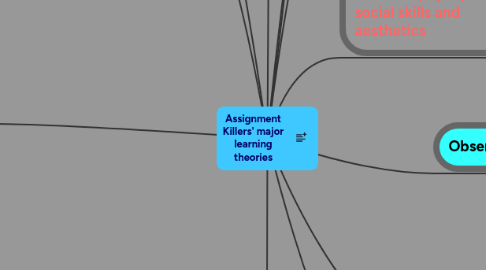
1. Curriculum and school culture
1.1. Pedagogy, learning and teaching styles
1.1.1. Patterns of thought, assumptions, beliefs, value, and norms
1.1.1.1. Essential learning experiences: moral and civic education, intellectual development, community service, physical and aesthetic development, and career-related experiences
1.2. Collaborative and interactive learning culture
2. Behaviorism
2.1. instructional
2.2. teacher centred
2.2.1. Teacher act as model and students need to follow.
2.2.1.1. punishment as negative reinforcement?
2.3. buidling up foundation of subject knowledge
2.3.1. may be suitable for young kids?
2.4. value, moral education
2.5. essential in early stage of childhood development
3. Cognitivism
3.1. Procedure
3.1.1. Input & output
3.1.1.1. Recognize Pattern
3.1.1.1.1. Practices or drilling
3.2. data mining based on a particular issue
3.2.1. Searching for facts and comments from other people and media, such as the Internet, books, newspapers and journals, related to that issue
3.2.2. Gather the materials obtained.
3.2.3. Filter out irrelevant materials.
3.2.4. Process the rest of the materials by sorting them based on different meanings, extracting useful points and grouping those points together with personal opinions and feelings to form complete reflection about the issue.
3.3. reinforcement
3.4. programming concepts
4. Constructivism
4.1. Student centred
4.1.1. Teacher act as facilitator
4.1.1.1. giving out guidance instead of "model answer".
4.1.2. The success is depends on how active the students partcipitate
4.1.2.1. Teacher needs to motivate the students to find information from different channels and think critically on whether the materials found are useful.
4.1.3. Learners try to explore the topic, and knowledge are constructed by all learner's contributions. (They should learn actively.)
4.2. Group discussion
4.2.1. Open-ended topics
4.2.2. Facts, opinions and comments
4.2.2.1. Students need to be critical to the area of study.
4.2.3. Obtain a conclusion
4.2.4. Presentation of the conclusions by groups
4.3. less teaching,not delivery contents, more leading, enquire based
4.4. Learning with technology
4.4.1. Learners use IT as one of their information pool
4.4.1.1. googleing
4.4.1.1.1. Require research skills
4.4.1.1.2. students are required to understand and select useful information as their resources.
4.4.1.2. cognitive tools
4.4.1.2.1. e.g. mahara
5. Teacher leadership
5.1. Teachers as role model
5.1.1. Students with positions of responsibilities
5.1.1.1. Prefect
5.1.1.2. Form extra curricular clubs by students, teachers can act as an advisor.
6. All-round development: domains of ethics, intellect, physique, social skills and aesthetics
6.1. Key learning tasks: civic education, reading to learn, project learning and information technology for interactive learning
6.1.1. Subject knowledge
6.1.2. Communication skills, creativity and critical thinking
6.2. Assessment for learning
6.2.1. Mixed formative and summative assessment tools
7. Brain-Based Learning
8. Multiple Intelligences
8.1. Existential
8.2. Picture
8.2.1. use visual stimulation instead of talking
8.3. Spatial
8.4. Kinetic
8.4.1. explore or learn by actually doing it
8.4.1.1. Trial and error
8.5. spiritual
8.5.1. Religious activities
8.6. Linguistic
8.6.1. Language skills
8.6.1.1. Vocabulary
8.6.1.2. Sentence structure
8.7. Interpersonal
8.7.1. Communicate with other classmates and teachers.
8.7.2. Learn from peers.
8.7.3. Attitude towards other people.
8.8. Intrapersonal
8.8.1. Self-management
8.8.1.1. Know what should do and what should not do.
8.8.1.2. Control temper
9. RightBrain/ Left Brain Thinking
10. Control Theory
11. Observational Learning
11.1. Agreement on instructional goals
11.1.1. Key learning goals: responsibility, national identity, habit of reading, language skills, learning skills, breadth of knowledge and healthy lifestyle
12. Supportive learning environment
12.1. Intellectual inspiration and motivation
12.1.1. Life-long learning
12.2. Community and family support
12.2.1. All-round education
